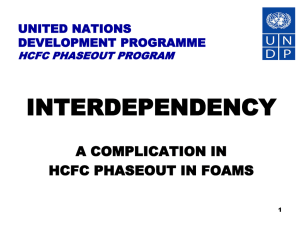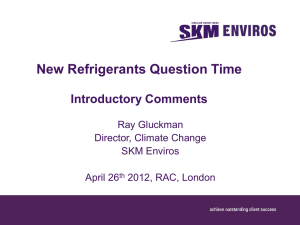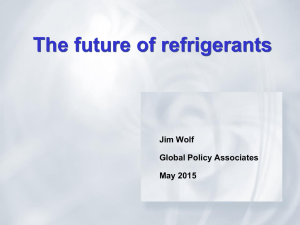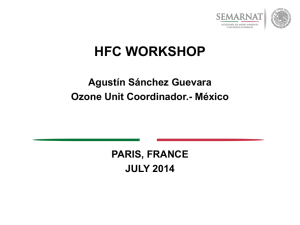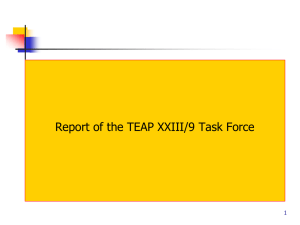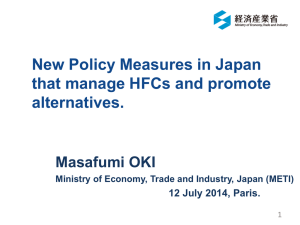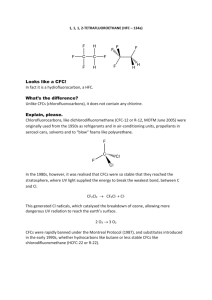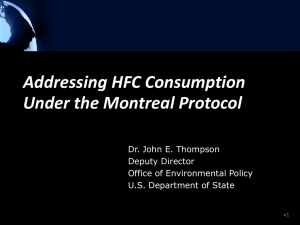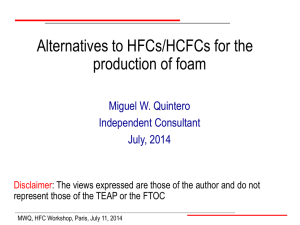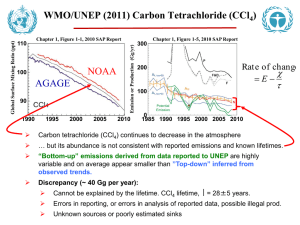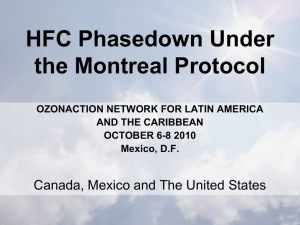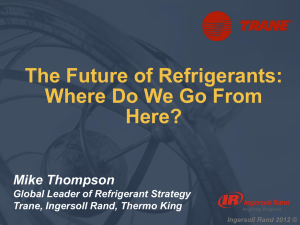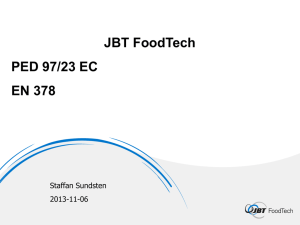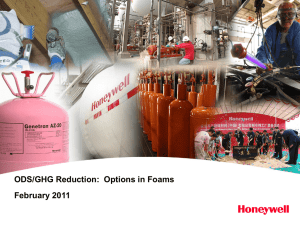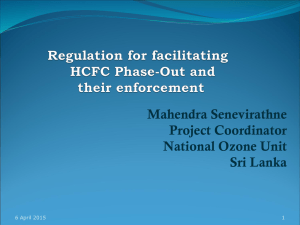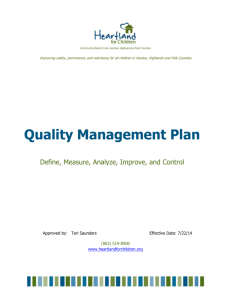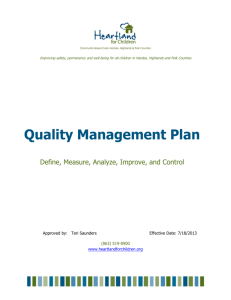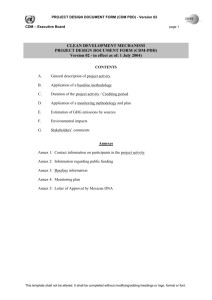Domestic Refrigeration and Appliances
advertisement
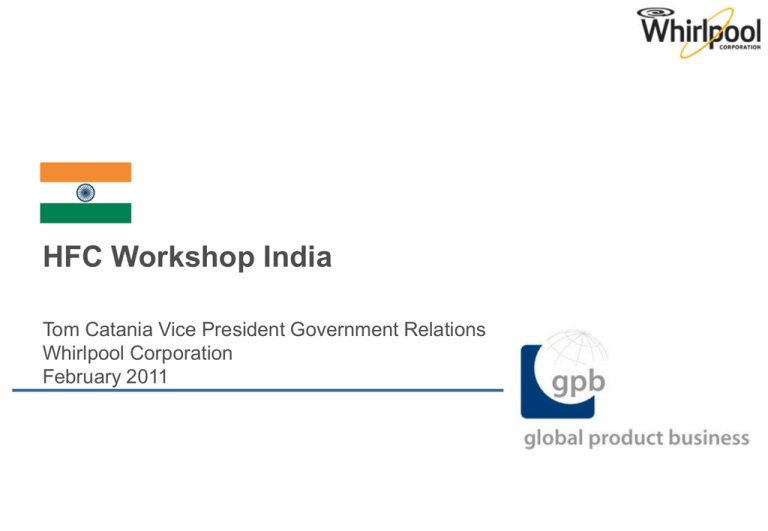
HFC Workshop India Tom Catania Vice President Government Relations Whirlpool Corporation February 2011 Why is Whirlpool still using HFCs in USA? - Cost of transition Energy efficiency advantages of HFC 245fa trumps GWP impact - Cheapest and least consumer utility compromise for achieving high efficiency - HFCs can be used responsibly and recovered - HCs still are subject to VOC emissions rules - Even modest litigation risk in USA when using isobutane refrigerant in a no-frost refrigerator can not be taken lightly in the US litigation, class action environment - Most importantly, new chemicals/technologies on short term horizon that may have positive characteristics of HFCs without the negatives of HCs or HFCs - “RETOOLING FATIGUE” 2 Simple Message: TEWI (Total Environmental Warming Impact) The “Use” Phase of a long lived residential refrigerator and the power plant emissions associated with that use has a more significant environmental impact than the manufacturing phase or end of life—especially if the refrigerants and blowing agents are responsibly managed and recovered. The ideal combination of refrigerants and blowing agents in residential refrigerators would have zero ODP, very low GWP, low toxicity, be safe AND BE ABLE TO DELIVER THE HIGHEST POSSIBLE LEVEL OF ENERGY EFFICIENCY AT THE LOWEST POSSIBLE COST OR COMPROMISE OF CONSUMER UTILITY HYDROCARBON FOAM INSULATION AND BLOWING AGENTS MAY NOT BE THE BEST/LAST ANSWER Refrigeration manufacturers have “retooling fatigue.” - CFCs-HCFCs-HFCs-HCs-HFOs-? - continuous retoolings steal capital from investment in new environmental breakthroughs in the important areas of energy efficiency and smart products on smart grids, for example 3 Foam HFC / HCFC / NEW TECHNOLOGY? ODP GWP ENERGY EFFICIENCY CFC HFO HFC CFC HCFC HCFC HFO CFC HCFC HFC HC HC HC HFO HFC GWP Zero High Low Energy High Worst Best Ideal Equation for longer run would be 0 ODP , Low GWP , High Energy Efficiency Foaming agents used today have element’s of all 3 , but not all the best characteristics Ideal Opportunity Managing proper disposal & usage of VOC’s ( Hydrocarbons ) during service , transport etc HFC’s have been used extensively , however have a high GWP impacting the environment HFO’s to provide the best new solution moving forward for energy & environmental benefits 4 GDP / GROWTH / PENETRATION / POTENTIAL – India Case Refrigerators are a ~6.2 mn units industry, growing aggressively YOY Currently, only 14% of the market is penetrated, expected to grow to 25% by 2015 Most of the Indian market is Direct Cool (78%) DC market is growing faster than the Frost Free market, driving refrigerator penetration in India Potential Equation India’s Economic Prosperity CAGR 8% + Indian Consumer’s buying potential = Higher sales of refrigerators ( e.g. DC ) products on the market CAGR 11.5% Need to make the right selection of Blowing Agents and refrigerants with the broader & longer environmental picture in mind Growth of low income purchasers and total volume requires solutions that don’t drive the wrong behavior 5 Providing value to the masses Entry-level consumers for both Direct Cool and No Frost are extremely price-conscious, seeking ‘value for money’ Energy efficiency / Eco moved up from 8th to 4th place in importance in purchasing an appliance (behind brand, price & color) Direct Cool sales in INR No Frost sales in INR BULK SALES ON ENTRY LEVEL PRICES POINTS HFO HFC - 245 HC HFC - 134 Source : DuPont HC’s significantly increase the GWP effect on the environment moving forward Early tests not in optimized refrigerator and assumes full venting of HFCs Consumers Understand Energy Efficiency, not GWP… Continue To Seek ‘Value’ 6 Risk of converting too early? HIGH ODP LOW GWP ZERO ODP ZERO ODP . LOW GWP , ENERGY EFFICIENCY HFC CFC HCFC HC BLENDS HFO 3-4 years until mass production ( est. 2014 / 15) Ideal Opportunity Manufacturer’s globally as well as in India to comply with global regulations for material usage ( HFC etc ) Every step requires a large investment from a manufacturer that affects product cost , design etc o Investments need to be recouped from sales resulting in possible price increases Unique situation in India as compared to mid 1990’s CFC phase out oEnergy Regulations are very stringent from 2012 – 2014 ( 60% jump ) oEnvironmental regulations force manufacturers to comply for chemical phase out SHOULD NOT FORCE THE USE OF A CHEMICAL RATHER SUPPORT THE DEVELOPMENT OF THE RIGHT CHOICE FOR THE ENVIRONMENT 7 Impact on the Indian energy grid Analysis of the impact of energy standard changes on the overall energy consumption Energy regulations impact on the Indian grid Indian grid consumption (mil. Kwhr/yr.) Today 3,000.00 Average energy-star purchases continue at today's levels 2,500.00 2,000.00 1,500.00 Average energy-star purchases change in line with plan (20% in 2012 & 40% in 2014) 1,000.00 500.00 2010 2012 2014 Note: Illustrative calculations only, qualitatively correct; Market penetration & growth have been factored in Currently, on average, India’s average buying is ~3.7 energy efficiency level If they move up by 20%, then overall energy consumption will come down (GREEN) If average buying behavior does not change DUE TO COST, overall energy consumption will increase (RED) Need to Promote Energy Efficiency & Eco Conscious Lifestyle for the Indian Consumer 8 Conclusion – India should not rush into a sub-optimum solution that limits potential “use phase” emission reductions* *Or has the unintended consequence of consumers trading down to less expensive, but less efficient models Our Proposal for residential refrigerators: Modest delay (1-2 years) in HCFC phase out India could lead rest of the world in development and export of next generation solution 9 Thank you ! 10 Synergy between Energy Efficiency & TEWI KEY TAKEAWAY’S ENERGY ATMOSPHERIC EFFICIENCY EFFECTS ENERGY EFFICIENCY 20% JUMP IN 2012 40% JUMP IN 2014 RESPONSIBLE USE OF MATERIALS 2013 phase out for HCFC Overall goal by Montreal Protocol to reduce carbon emissions by 2030 RIGHT BALANCE NEEDS TO BE ACHIEVED AND NOT MUTUALLY EXCLUSIVE INDIA FACED WITH CHALLENGES OVER THE NEXT FEW YEARS TO LOWER OVERALL ENERGY INTENSITY WHILE PHASING OUT HCFCS 12 TODAY’S LANDSCAPE BUT NEED TO LOOK FURTHER? Low Environmental Impact Energy Benefits : Medium High No ideal BA found that has 0ODP , low GWP , and high energy benefits CFC Use of HFC’s growing however still has a high GWP HCFC HFC HC HFO Time Aim to drive right investment’s for an ideal blowing agent ! INNOVATION UNDER THIS SPACE TO PROVIDE MOST IDEAL BLOWING AGENT SOLUTION FOR THE ENVIRONMENT 13 Unique Issues to the Indian Market Supply Base Impact if moved to a foam that impacted energy & environment: o Use of High Efficiency components like VIP’s , VCC compressor’s to meet energy regulations 2012-2014 o Diminishing return’s and high cost’s could potentially lead to higher product cost o Consumer’s forced to purchase lower energy efficient product o These step’s would negate entire purpose of reducing energy & environmental impact in the country Lack of Incentives for higher energy rated & environmentally friendly products o Lack of incentives by the govt to drive higher sales of energy & environmentally friendly products o Manufacturers forced to comply to standards however unsure on consumer behavior o Funding opportunities present in multiple regions like Mexico ( e.g. UNIDO funding ) Infrastructure Concerns o Servicing of VOC’s o Incremental increase in material costs & import duties Other? 14 Opportunities for India Infrastructure Government & Manufacturers partnership in developing low cost components for the “World” o Foam ‘s , refrigerant’s , etc Providing incentives for manufacturers to assist in the Indian government’s goal to help reduce energy efficiency & carbon emissions part of the 11th five year plan o Incentivize use of high cost components like VIP’s VCC’s etc Create an EPR framework for safe disposal of components o Create awareness amongst Indian consumer for the need of supporting global cause Look for opportunities beyond regulatory landscape that would help make “India a leader in this space” o Partner with key leader’s in technology development in new areas like Smart Grid Consumer Awareness Creating an awareness for the need & value to purchase energy & environmentally friendly products o Promote the use of product’s with special consideration’s from govt & manufacturers o Tax credit’s / rebates for energy & eco friendly product’s 15
